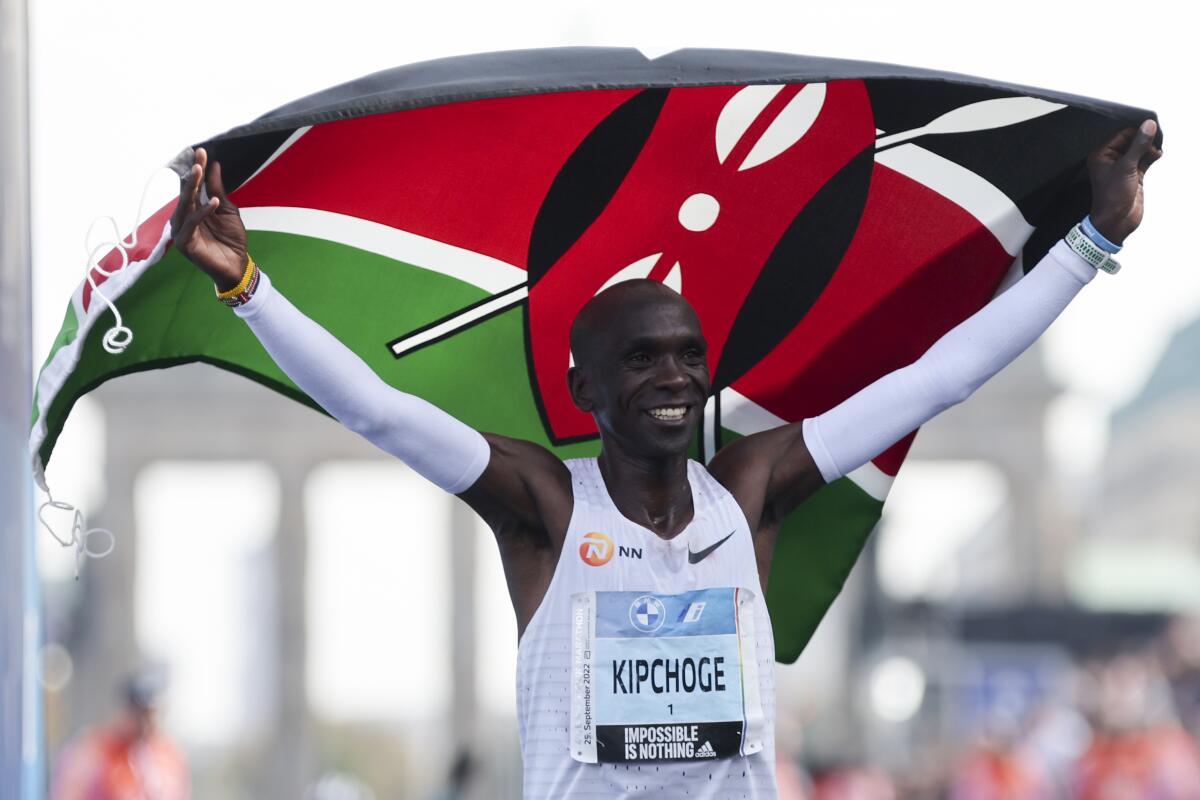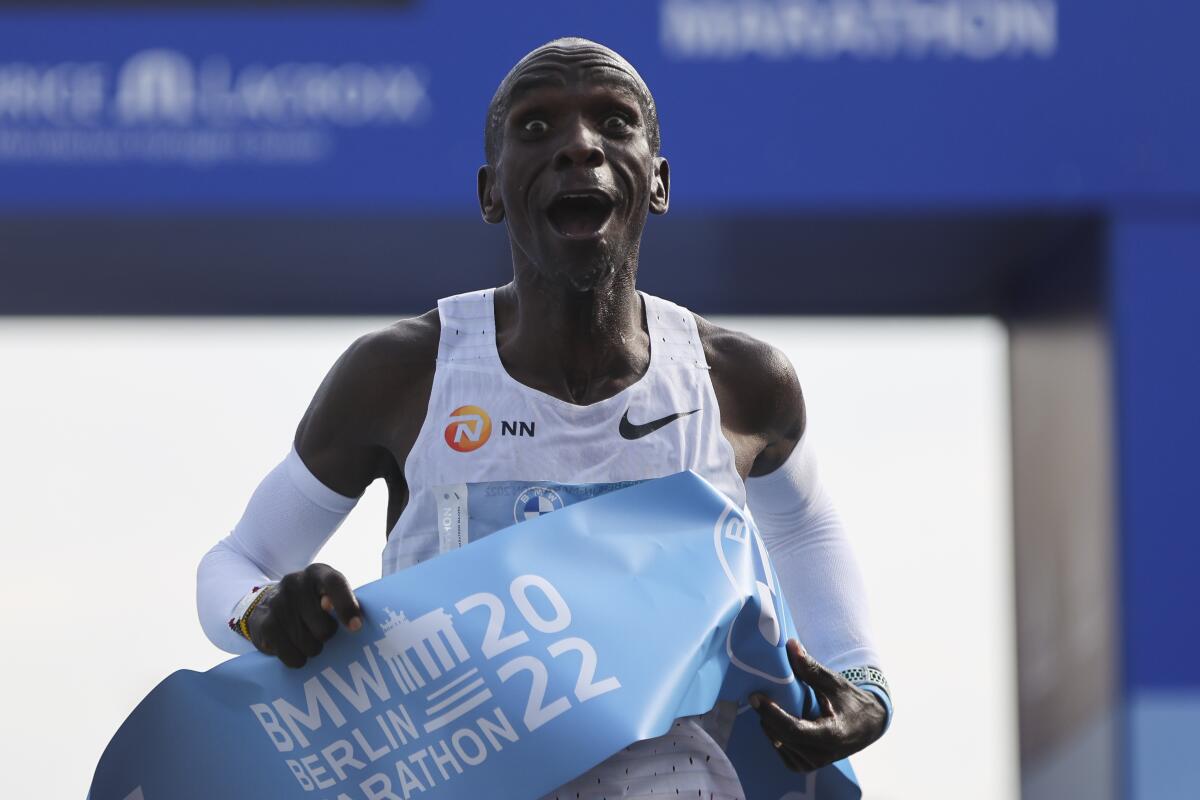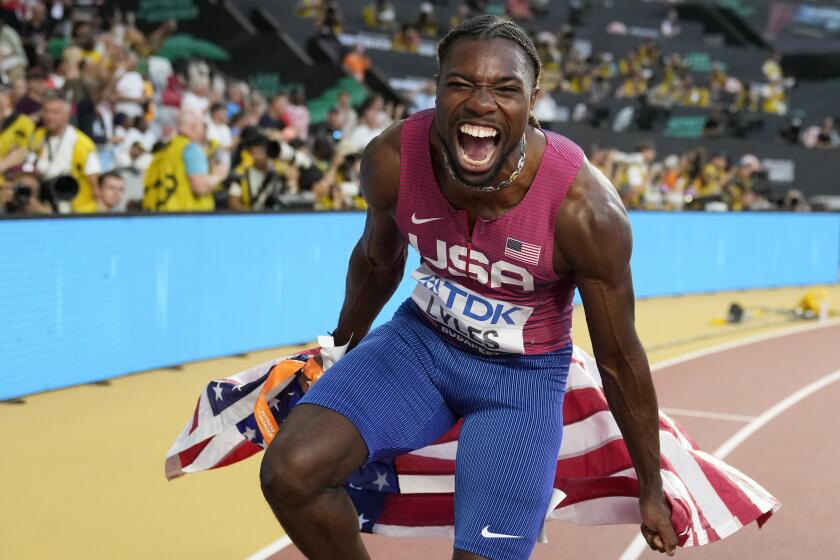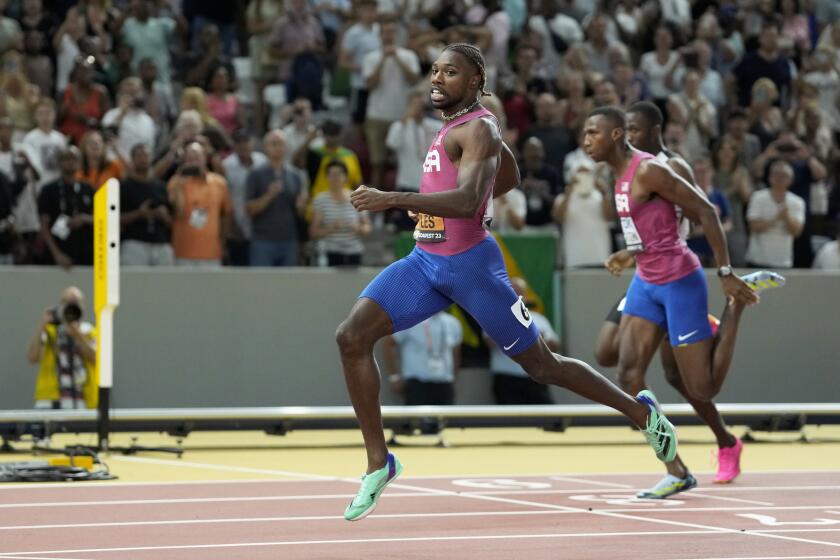Meet Eliud Kipchoge’s secret weapon for winning the Berlin Marathon: Bottle Claus

- Share via
Before he set off on a bicycle race across the United States this summer, Claus-Henning Schulke was last-minute shopping in Oceanside when he noticed three teenagers approaching him in the Wal-Mart aisle.
“Are you Bottle Claus?” they asked.
Schulke is not a TikTok star. He is not a renowned singer or an artist. He is a 57-year-old civil engineer from Berlin with silver hair and clear-rimmed glasses.
Yet among running fans, he has become internationally recognized all the same because, since 2017, he has been the guy who hands Eliud Kipchoge, the world’s fastest marathoner, his bottles of nutrition during the Berlin Marathon. Runners who tune in to watch Kipchoge have grown intrigued by the middle-aged volunteer who punctuates every successful handoff with a double fist-pump celebration and helps keep Kipchoge on record paces.
“The task of delivering water is super mundane, right?” said Kevin Sully, the cohost of the “House of Run” podcast. “I’d never really thought about it. Part of my surprise was that his reaction and his attention to detail, his skill, was perfectly matched to Kipchoge. It was like they found the all-time great water bottle delivery guy to go hand in hand with the all-time great marathoner.”
Kipchoge called Schulke a “hero” for assisting him in refueling during his 2018 world record. Others, like the teenagers in Oceanside, call him the nickname that has stuck since he went viral five years ago: Bottle Claus.

“I was so astonished,” Schulke said of being recognized in Southern California. “It made me proud because ‘Bottle Claus’ seems to be known all over the world.”
When the Berlin Marathon returns Sunday, the world again will be watching Kipchoge, the 38-year-old Kenyan, and the clock. Among the six marathons considered the most prestigious, Berlin is unique because its pancake-flat course produces exceptionally fast times. The last eight men’s marathon world records have been set there, including by Kipchoge in 2018 and again last year, when he finished in 2 hours 1 minute 9 seconds.
The race is unique among the major marathons in another way, which is why the spotlight again will be on Schulke too when the world’s first (and likely only) celebrated bottle-passer and the most famous marathoner partner for a fourth time. Where other races place athletes’ bottles of nutrition on tables throughout the 26.2-mile course to be picked up by runners, Berlin organizers use a lottery to pair a few dozen elite men’s and women’s runners with a specific volunteer who waits at every aid station, waiting to hand them their bottle.
Schulke has been passing bottles to runners with the same enthusiasm since he began volunteering in 1997, and eventually began managing the volunteer team; this year he is expecting 50. When he was first assigned to Kipchoge in 2017, no one seemed to notice much — except Kipchoge, who requested Schulke handle his bottles the following year as well.
U.S. sprinter Noah Lyles wants to not only break world records, but also be the showman and star that track and field can use to elevate the sport.
A few days before the 2018 race, they formally introduced themselves and improvised a handoff technique. Spotting a vase with a tulip inside on a nearby table, Schulke held it from the base, and Kipchoge grabbed the top. On race day, they connected on 13 perfect handoffs and Kipchoge claimed his first marathon world record. Schulke would fist-pump every success, then hop on his bike, speeding ahead of Kipchoge to reach the next aid station about three miles away.
What Schulke didn’t know was that television coverage following Kipchoge’s stoic expression and metronomic strides also was beginning to highlight him, with broadcasters commenting on the exchanges. When Schulke returned to his phone after the race, he was inundated with messages from friends.
Google searches for “Bottle Claus” spiked in the following days and marathon organizers leaned into the fascination. Last year the marathon posted to YouTube a behind-the-scenes video that followed Schulke to the airport, where he helped pick Kipchoge up, and around the course on race day. “Didn’t know I can be so emotionally moved watching a man handing hydration bottles in a marathon,” its top comment reads.
“It’s this absolute enthusiasm with which he does it, an indescribable passion,” said Mark Milde, the director of the Berlin Marathon. “He celebrates the moment, Eliud and the whole BMW Berlin Marathon. Every cheer is then crowned by his so-typical double fist.”
The celebration is relief, because the handoffs appear deceptively simple. On the way to his 2022 world record, Kipchoge held an average page of 4:37 per mile, or about 13 mph. Bottle passers, meanwhile, are required to remain fixed in one place at aid stations. At the first several stations, the lead pack still is bunched tight, with up to a dozen runners cruising past at top speed as volunteers fight to be seen among a thicket of arms holding out bottles. It is a fluid situation in every sense.
Schulke makes himself seen by wearing a bright jacket, a band along one sleeve with Kipchoge’s name and an intensely focused expression.
“My biggest remembrance of Berlin is the guy who was handing me water,” Kipchoge said in 2021. “Still my hero.”
After the 2018 world record, Schulke received Kipchoge’s race bib, which the runner signed with a message: “Dear Claus: Without you I would not have managed to run this world record.”
A former marathoner who finished six Ironman triathlons, Schulke understands the repercussions of a bottle not delivered. For athletes operating at the limits of endurance, mid-race fuel — usually a drinkable mix of electrolytes and carbohydrates — is essential for replenishing depleted energy. Books on marathon training devote entire chapters to the importance of mid-race refueling. Even someone as accomplished as Kipchoge, a two-time Olympic gold medalist who in 2019 became the first to complete a marathon in less than two hours — a record that never was ratified because the race was tailored just for Kipchoge, including numerous wind-breaking pacemakers — isn’t immune. Though several factors could have contributed to his stunning fade late in April’s Boston Marathon, Kipchoge couldn’t grab a bottle of nutrition from one aid-station table 19 miles in, and quickly lost his lead.

Schulke rides the marathon course in the days before the race to inspect aid stations. On race day, he instructs volunteers to study the headshot of their assigned athlete, how to shake the bottles and open their mouthpiece. He carries a backpack with an air pump, tire patch and extra air tube for his bicycle and the weight of what could go wrong. Then again, the logistics of high-stress details are kind of his thing: As part of his day job for a large Berlin construction firm, he once helped oversee a decade-long reconstruction of a palace in the city center that carried a budget of nearly $700 million.
“The night before it’s hard to sleep because so many things can fail,” Schulke said. “I’m always very, very happy if it works well.”
He is grateful for Kipchoge’s trust and hopes the runner sees in Schulke someone as dedicated to his supporting role as Kipchoge is in his. The runner, he said, always has been warm toward him.
“He is a very special person — he can just perform,” Schulke said.
Schulke is similarly appreciative of the attention Kipchoge’s feats indirectly have conferred upon him, even if he is sometimes mystified why, for example, a YouTube video of his handoffs to Kipchoge last year has been watched 2.8 million times. His best explanation is the power of connection, how two people from disparate backgrounds and continents unexpectedly have worked together.
“Maybe it’s one of these positive stories we were looking for in these times,” he said.
Sully, the track and field podcaster, also believes there is something to the idea of connection. In road running, the slowest can compete on the same course, and on the same day, as the fastest. A volunteer such as Schulke can play a vital role in the performance of the elite.
“I don’t know what the other sport equivalent would be,” Sully said. “You’re not able to string Roger Federer’s racket for him. Can you be someone’s cut man in boxing just because you love the sport and are passionate about it?
Here are nine questions that were answered at the World Athletics Championships in Budapest as the 11-month countdown begins to 2024 Paris Olympics.
“I think what was cool is that is exactly, I think, how all of us would react because he would have such immense pressure on him to do it right, because who wants to screw up a Kipchoge world-record attempt? It’s like a work of art.”
Roles were reversed in June, when Schulke arrived in Oceanside for his bicycle race across America with his own support team of eight friends. For two days they fed Schulke nothing but energy drinks, some the same kind used by Kipchoge. By the time Schulke hit the Rockies he was begging for muesli, pasta and ice cream. When he rolled into a firehouse transformed into an aid station in Kansas, a volunteer had decorated a cookie with “Bottle Claus.”
When he finished after 11 days and 3 hours, he went to a Maryland hotel, laid down and didn’t move for the next nine hours. A short time later he received a congratulatory video.
“It’s really impressive what you have done,” Kipchoge said. “All the very best. This is your friend, Eliud.”
More to Read
Go beyond the scoreboard
Get the latest on L.A.'s teams in the daily Sports Report newsletter.
You may occasionally receive promotional content from the Los Angeles Times.













